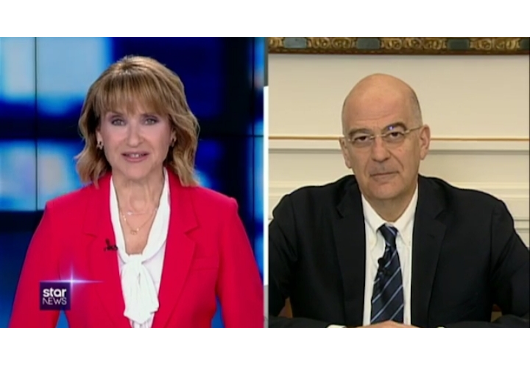 M. ZACHAREA: Good evening to the Minister of Foreign Affairs, Nikos Dendias, who is giving his first interview in quite some time. Thank you for this, Mr. Dendias. Good evening.
M. ZACHAREA: Good evening to the Minister of Foreign Affairs, Nikos Dendias, who is giving his first interview in quite some time. Thank you for this, Mr. Dendias. Good evening.
N. DENDIAS: Good evening to your viewers. I hope everyone is well.
M. ZACHAREA: I’ll start with Cavusoglu’s reaction. It’s as if Ankara is constantly looking for something negative to say about Greece, even on a humanitarian issue. Why?
N. DENDIAS: I don’t understand it completely. I think that, as you said, in the current state of affairs, Turkey is trying to maintain a tense climate in its relations with Greece, even on an issue such as this – the return of the Greek merchant seamen – which shouldn’t be used in this way by the Turkish side. In any event, we did our duty. We thanked Turkey for the assistance it offered the Greek government in bringing back the Greek seamen. How Turkey takes our expression of thanks is up to Turkey.
M. ZACHAREA: Turkey has been through quite an ordeal with the coronavirus. It is still facing difficulties in the health and economy sectors. But we see that, in spite of this, it is still using aggressive rhetoric towards Greece. We see that it is continuing its provocative actions over the Aegean, and we hear it is thinking of bringing back the pressure through migrant flows in Evros. What is your take on all of this?
N. DENDIAS: I’m certain that Turkey’s conduct in the Aegean and in the Eastern Mediterranean is not conduct befitting a modern state – a modern state that wants to become a member of the European family. In other words, respecting the whole framework of values that the European Union stands for.
There are the violations of Greek sovereign rights and, unfortunately, Greek sovereignty with the flyovers of the Greek islands. There are the surveys in the Cypriot Exclusive Economic Zone and in Cypriot territorial waters. There are the verbal provocations, beyond what you mentioned earlier. None of this helps our relationship with Turkey or, as I always say, Turkey itself. In any case, Greece is not a country that will be dragged down by the other side’s escalating of its rhetoric or conduct. As a country, we respect International Law and function on the basis of International Law. And, needless to say, Greece also defends its sovereign rights, as it is obliged to do as a member of the European Union and the United Nations.
M. ZACHAREA: Recently, there have been reports that Erdogan is gathering migrants with Covid-19 on Turkey’s shores, with the aim of their crossing, at some point – whenever they can, as soon as they can – to our country and from there to Europe. Is there any truth to these rumours and reports?
N. DENDIAS: I’m not prepared to believe that Turkey has a mechanism for separating migrants into those who are infected with the coronavirus and those who are not infected, and then pushing those who are infected to come to Greece. I’m not ready to say I believe that. But beyond that, we know that migrants have gathered on Turkey’s shores. We also know about Turkey's recent conduct and its effort to create migrant flows towards Greece and Europe. We dealt with this successfully, as a European country, with respect for the law and the European acquis. I hope Turkey has drawn the right conclusions from this incident and won’t repeat the endeavour.
M. ZACHAREA: Where do our talks with Italy and Egypt stand on the matter of delimiting EEZs?
N. DENDIAS: First of all, it wouldn’t be right for me make detailed public comments on ongoing talks ...
M. ZACHAREA: Just tell us a little.
N. DENDIAS: Of course. These are clearly key priorities for the Mitsotakis government. If you will, we delayed in settling these matters. I think that now is the time for us to find solutions with our neighbouring countries, and especially with friendly neighbouring countries.
M. ZACHAREA: Are we close to settling this?
N. DENDIAS: Look, we are engaged in sincere talks with these countries, so we hope we really are close. But I’m not prepared to say when and how a given negotiation will end, because there are many, many details. But in any case, it is my hope that, in the future, Turkey, too, will see that the path to resolving problems, any problem, is discussion based on International law, and not flyovers or violation of sovereignty and sovereign rights.
M. ZACHAREA: When will you start travelling again? So we know when citizens will be able to travel.
N. DENDIAS: Unfortunately, all of my visits have been pushed back. There was an extensive programme of bilateral meetings. I have to go to all the countries that are members of the UN Security Council, and we also have to deepen our bilateral relations in the context of our European Union family. I hope that, as soon as the situation improves – not just in Greece, where things went relatively well, thank God, but throughout Europe and the world – Greek diplomacy will be able to pick up where it left off.
M. ZACHAREA: Thank you very much for being with us, Minister.
N. DENDIAS: Thank you very much, and take care.
April 27, 2020


